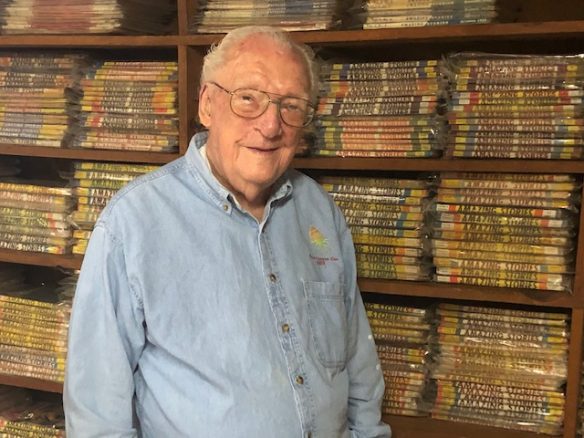
Happy one hundredth birthday, Bob Madle! We’re celebrating the date with the help of Rich Lynch, John L. Coker III, and Jon D. Swartz, plus highlights of interviews conducted over the years with the birthday boy himself!

Bob Madle: A Fan for the Ages
[This essay was originally printed in the Boskone 33 Program Book in February 1996. Photos were added when it was reprinted in My Back Pages 6 in 2011.]
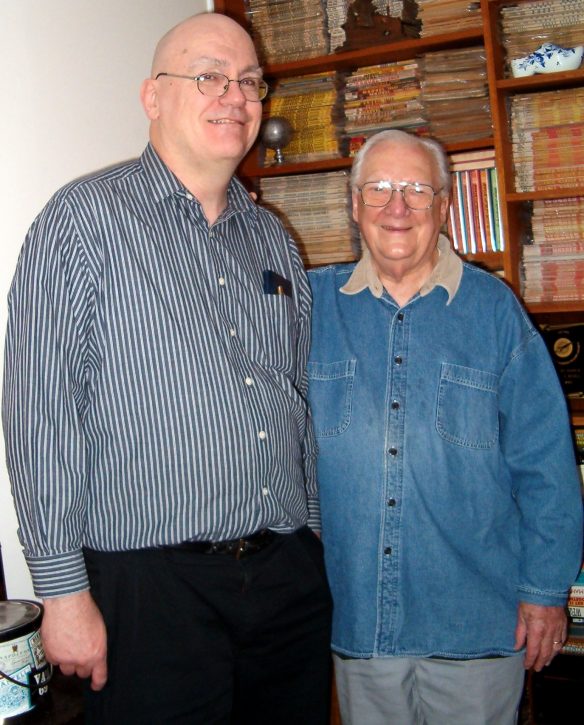
By Rich Lynch: Recently, I read somewhere that an average American’s life span is now over 72 years, up something like 100 percent over what the average life expectancy was for people who lived way back in the Middle Ages. Mankind doesn’t have the longest life span in the animal kingdom, of course; great land tortoises are reported to live well over 100 years, for example. Even longer lived, one of the bristlecone pine trees out in the Sierras was calculated to have lived for about 2,000 years, but even this pales in comparison to the ancient creosote bushes of the Mojave Desert, some of which are reportedly over 20,000 years old!
And then there’s Bob Madle…
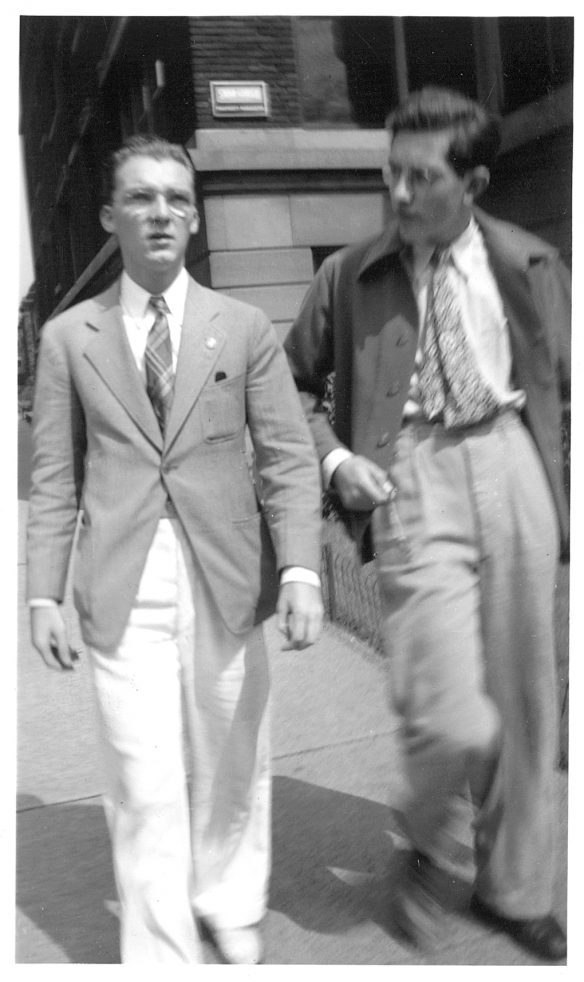
Now, wait just a minute! Before you think I’m having a little cheap fun at your Special Guest’s expense, I’ll hasten to tell you that no insult is intended. In fact, I meant it as a compliment! You see, Bob Madle is a member of that fabled Dinosaurs of Fandom organization, First Fandom, which he helped found back in the 1950s. To be a member of First Fandom, you had to be active as a fan no later than January 1, 1938, by taking part in such activities as writing letters, publishing a fanzine, or attending a fan gathering. Actually, Bob’s involvement in fandom dates back even further than that; he discovered that there was a fandom way back in 1933 when he found that letters from other fans were being published by Hugo Gernsback in Amazing Stories (Bob’s first published letter to Amazing appeared in the August 1935 issue). Once he discovered there were other fans, he was part of the vanguard to organize them: in 1935, Bob was one of the founders of the world’s second oldest continuing science fiction organization, the Philadelphia Science Fiction Society. And in 1936, Bob was one of the attendees of the very first science fiction convention ever held, when PSFS hosted a contingent of fans from New York City.
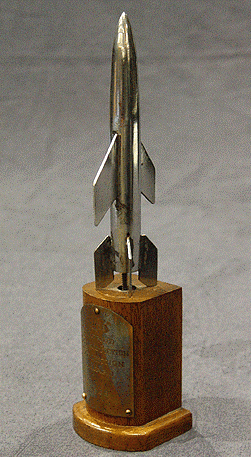
Now that alone is a pretty impressive resume, but it doesn’t nearly end there. The first World Science Fiction Convention was held in New York City, in July of 1939. Bob was there. He was also at the second, in Chicago in 1940, and the third, in Denver in 1941. He even attended the very first Boskone, in 1941. After World War Two finished interrupting just about everyone’s fan activities, Bob became involved with the running of Worldcons, as part of the committees for the Philadelphia Worldcons in 1947 and 1953. And there’s more: he was one of the decision-makers of that 1953 Worldcon committee that came up with the idea for the Hugo Awards, which were presented for the very first time at that convention.
But there’s still more! I can’t end this appreciation without mentioning that Bob did much to organize fan groups in other places besides Philadelphia. In the early 1950s, for instance, he was a founder of a fan club in Charlotte, North Carolina, which led to some of the first science fiction conventions ever held in the southeastern United States. Much of today’s very active fandom in that region can be traced back to these origins. And in 1957, Bob was elected North American delegate for the still-new Trans-Atlantic Fan Fund, which had been conceived just a few years earlier. TAFF brought Bob to the very first non-North American worldcon, which was in London that year. (This resulted in one of the best fan trip reports ever written, which he titled for obscure reasons, A Fake Fan in London. But that’s another story…)
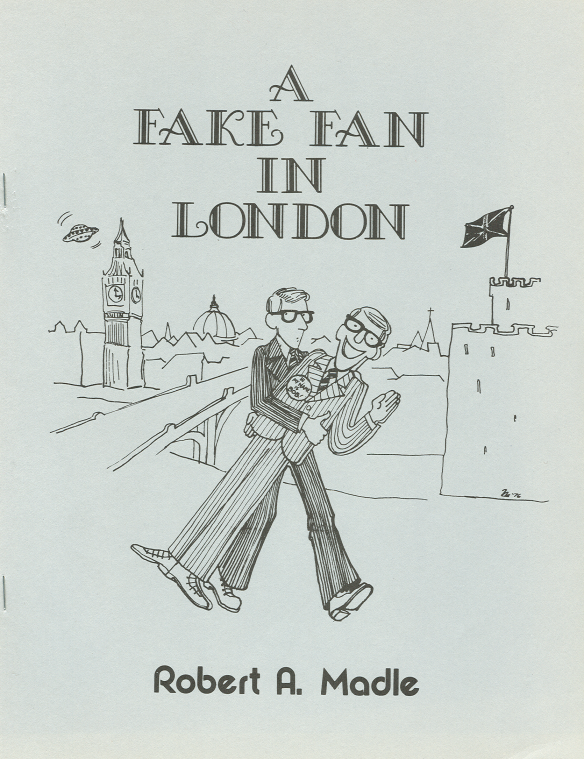
Anyway, it’s only because Bob has spent much of the past few decades as a dealer of rare and hard-to-find science fiction books and magazines that his fan activity has finally slowed by just a bit. Not by so much that I can keep up with him, though! Even now, sixty years after that first science fiction convention, he still gets to more conventions each year than most other fans, myself included. So when you talk with him, ask him about some of these adventures. You’ll find he’s easy to chat with, and who knows? You might even find yourself buying a book from him that tells all about some of those yesteryear exploits of fandoms past.
I began this introduction of your Special Guest with a metaphor; I’ll finish it with another. Even though the dawn of science fiction fandom happened way back in the 1930s, we should remember that fandom is really still quite young; the fact that many of its founders are still active is something we can treasure. Bob Madle is such a treasure; he’s living history – a fan for the ages.
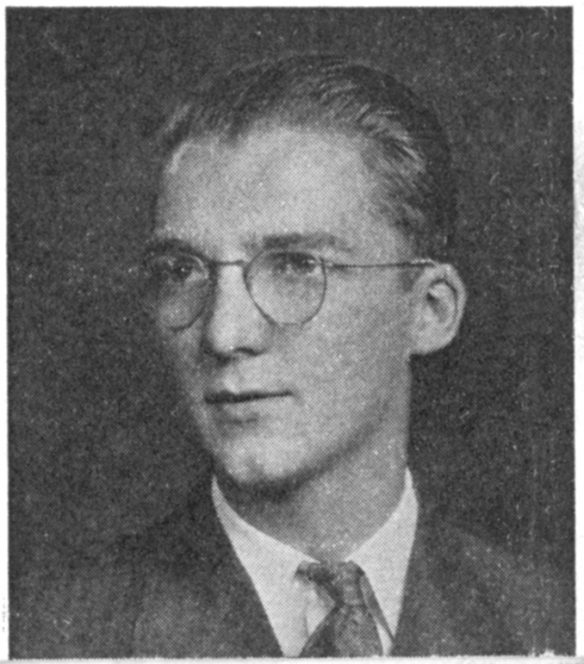
Robert A. Madle – In the First Person
(Excerpted from conversations with John L. Coker III during 1994 and 2006-2008)
My name is Robert Albert Madle and I was born June 2, 1920, in Philadelphia, Pennsylvania. I grew up in the City of Brotherly Love and attended Northeast High School. I started reading when I was very young, and by the age of nine I had a big collection of boy’s books. I discovered science fiction in Tom Swift, then began reading Edgar Rice Burroughs. I was a great Buck Rogers fan. I was ten years old when Just Imagine came out. I thought that that was the greatest movie ever made.
In 1931 John V. Baltadonis and I discovered two issues of Wonder Stories in a junk shop. A few months later, my father gave me two dollars to buy a new pair of Boy Scout trousers. So, to downtown Philadelphia I went. I never did get the trousers, as an incident of vast importance intervened. I happened to see a large window crammed full of Wonder Stories, Astounding Stories and Amazing Stories. I entered to find many more issues–and they were six for twenty-five cents! I bought two dollars of the treasures to start my S-F collection. Several weeks later, my father discovered what had occurred. I don’t recall exactly what happened but I’m sure it wasn’t pretty.
In 1934, I formed the Boys’ Science Fiction Club with Harvey Greenblatt, John V. Baltadonis and Jack Agnew. My very first letter appeared in the July 1935 Pirate Stories. I was a Gernsback fan, and anything he published I picked up. I read his editorial in the first issue. He said that they would publish pirate stories of the past, the present, and yes, even of the future. So, I wrote a letter saying that they ought to publish a novel about a space pirate and they should get Edmond Hamilton to write it. They printed the letter and I won a year’s subscription to Wonder Stories. I was fourteen years old and I thought that this was one of the greatest things that ever happened.
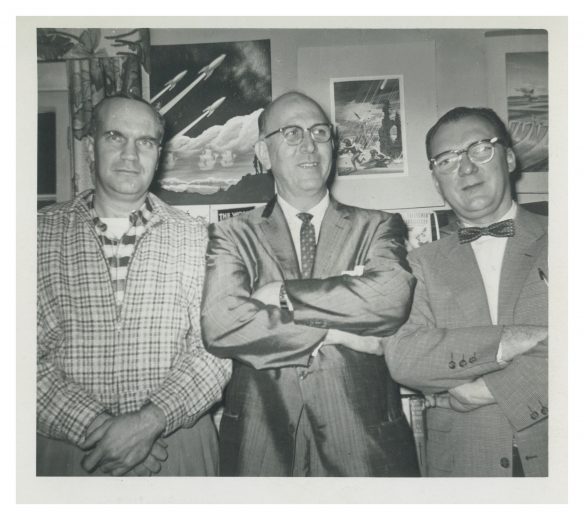
Gernsback announced the formation of the Science Fiction League in the April 1934 issue of Wonder Stories. In the May 1934 issue, he went into more detail about how science fiction was a literature that was a force that would change the world forever. It would be a wonderful world of tomorrow where science rules everything. It was the Gernsback Ideal. I was thirteen years old at the time, and I thought “Wow! I could be a part of this.”
In October 1936, the New York group – Donald A. Wollheim, William S. Sykora, John B. Michel, Fred Pohl, Herbert E. Goudket, and David A. Kyle – made a train trip down to Philadelphia. They were met downtown by Milton A. Rothman, Oswald V. Train and me. We showed them around the city. Later that day, John Baltadonis and several others joined us at Milt Rothman’s house. Then we actually had a meeting. As Sam Moskowitz said in The Immortal Storm, if we hadn’t had that little meeting, we could not have called it the first convention. The first science fiction convention would have been the one in Leeds, England, in early 1937.
At the first World Con – New York, 1939 – everybody was being let in, including the Futurians, although the promoters were very wary of them. Someone did discover a bunch of propaganda that the Futurians had stuck in between the steps with the intention to distribute later. At that point, Moskowitz kept them from entering – Wollheim, Lowndes, Michel, Gillespie, Kornbluth and Pohl. This has gone down in fandom history as “The Exclusion Act.” Later, a number of us went over to Coney Island, and had a photograph made where we’re all sitting in an old car. It would be two months before England and France would declare war on Germany, but we knew it was on its way. When Japan attacked us, most fans went into the military.
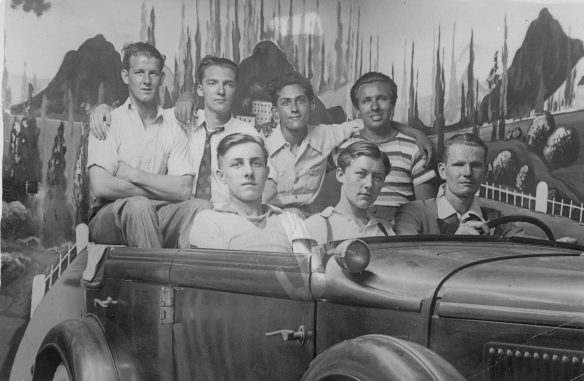
I enlisted in the Army in July 1942, but wasn’t much of a fighting man. For some reason, probably because I had a driver’s license, I wound up as a truck driver, even though I had never driven a truck in my life. I had gone in under a new program, because of my bad eyesight. They had just started what they called “limited service,” non-combatant duty.
Next thing you know I’m heading for overseas duty. I was called in to see the captain, who said that I wasn’t supposed to be in that outfit. The orderly room said that there was an opening in the signal office for a teletype operator. That is how I met my wife Billie, a switchboard operator at the time.
There was a period when I was assistant to the public relations officer. He was looking for somebody who could write and had something that had been published. The job had to do with writing news articles for the Charlotte newspapers. Because of all the writing that I had done, I received a promotion. I spent three and a half years in the service.
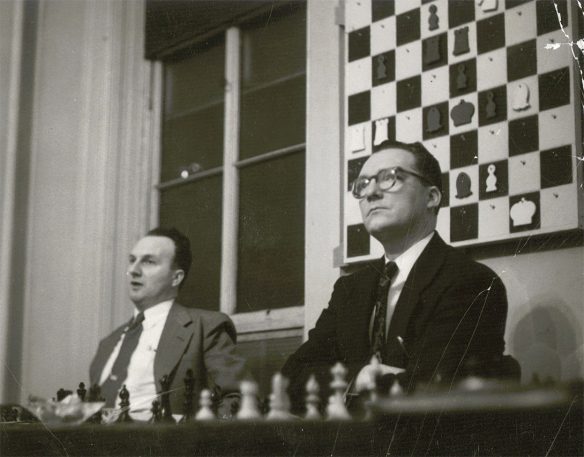
I got married during the war and already had a three-year-old son when I started college. After I graduated, I worked and went on for my MBA at night. I got a job in Charlotte, North Carolina, and after that I worked for the government in Washington, D. C. I went to work for the Navy Department doing personnel research. We helped determine requirements for future weapons systems and worked with the contractors. Later, I had the background and school credits to become an engineering research psychologist and was involved with the interfaces between man and machine.
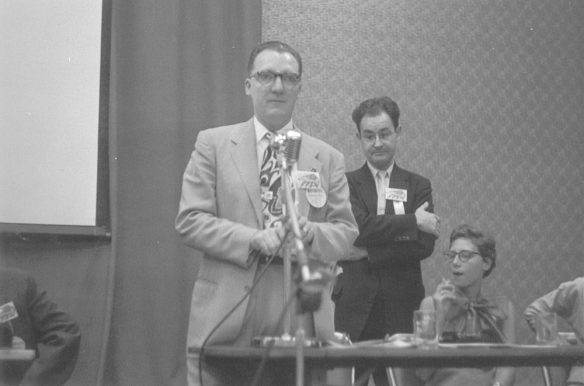
One day in October 1958 I received a call from Don Ford, saying that Doc Barrett was having a small group over at his place in Bellefontaine, Ohio and I was invited. When I arrived, the group was already there. They consisted of Doc Barrett, Don Ford, Lou Tabakow, Ben Kiefer – four old-timers – and a youngster named Stan Skirvin. We all sat around and drank beer and talked of the tumultuous events of the day.
It was kind of an opportune coincidence how First Fandom came up. Someone once claimed that he saw something written on a toilet wall, which said, “First Fandom is not dead!” Recalling this, I said, “What science fiction needs is a new organization, one in which the old-time fans are paramount, instead of those young upstarts who wouldn’t know a 1933 Amazing Stories if he tripped on it.”
Don was immediately for it, and said, “Great! We can give recognition awards to the great authors of the past such as E.E. Smith, because none of them will ever get a Hugo.” Everyone was enthusiastic about the idea, and great plans were conceived right then and there. Don said, “To be a member, one would have to be active in some phase of science fiction prior to January 1938.” A magazine would be published. Don thought it should be a formal organization. But serious things would be accomplished also, mainly, keeping the history of SF in front of the fans of SF today. Membership credentials would be required and acceptance would be tough. It would be a Last Man Club, with the last First Fandom member alive in a certain year knocking off a privately held fifth of liquor.
Don suggested that I be president, as it was my idea. Lou and he would share the secretary and treasurer’s duties. Lynn Hickman was contacted and he became the official editor. Announcements were sent out, and the first person to join – Member Number One – was Robert Bloch. I never called an official meeting, and I remained president for over twenty-five years.
When I was young, the sense of wonder meant “Gosh! Wow! Boy oh boy! Stories of how great the future’s going to be! How science fiction is going to be the most powerful force that would change the world.” The magazines had personality – fans wrote letters and editors commented on them. In fact, I received several letters from the editor of Astounding, F. Orlin Tremaine, in response to my letters. One issue claimed that he got the best stories from the best authors, but I told him that he got the worst stories from the best authors. He wasn’t too happy with that comment. The magazines had an aura about them. To me, that was the sense of wonder.”
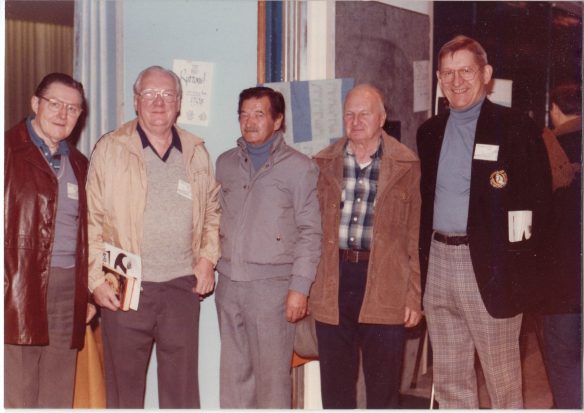
MORE HONORS, AWARDS, AND PUBLICATIONS. Notes by John L. Coker III & Jon D. Swartz
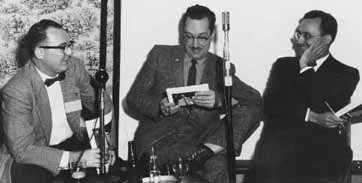
Bob Madle was the TAFF winner in 1957, and published his famous A Fake Fan in London as his trip report. Also at the 1957 Convention Bob became a member of St. Fantony.
Bob’s other fan publications include Fantascience Digest, Fantasy-Fiction Telegram, Fanzine Review, and PSFS News. For the prozines he wrote a column, “Inside Science Fiction.” Bob was also distributor of the British prozine Nebula.
Bob’s Guest of Honor appearances, awards, and other honors over the years include: 1974, Big Heart Award; 1977, FGoH, Suncon; 1982, GoH at Lunacon; 1990, elected to the First Fandom Hall of Fame; 1996, Special Guest, Boskone 33; 2002, Sam Moskowitz Archive Award; 2012, GoH at Philcon.
Bob is also credited with naming the Hugo Award, and was Treasurer of Philcon II. In 2014, Madle was nominated for a Retro Hugo Award for Fantascience Digest.
For many years Bob has been a highly respected book dealer, specializing in rare science fiction and fantasy books and magazines.
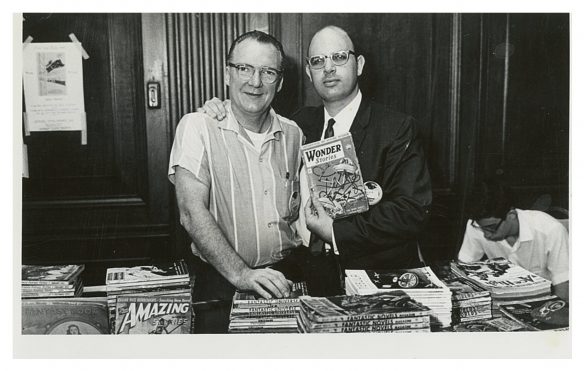
Discover more from File 770
Subscribe to get the latest posts sent to your email.

Congratulations to Bob!
Bob is a fannish and scientifictional institution—and one heckuva nice guy, too!
Mike, I’ll send you a few photos of him to publish if you want.
I’ve met Bob a few times at Philcon in the past few years, and he was always delightful. I suspect he also secretly enjoyed the awe he generated in those around him due to his BNF status, though he never showed it. Too bad he won’t see these tributes.
It’s been an honor to know Bob for almost 50 years, and I wish we still got to see him at cons. I’m delighted to see him looking so well in that photo from last month. Long may he remain the Dean of Trufans and Fakefans alike.
Huzzah! Happy 100th birthday to Bob, who I hope is spending a delightful bunch of his day reading birthday cards from fans near and far. Many thanks to File 770 for these articles; I learned a lot more about Bob and his multitudes of accomplishments reading them.
Congratulations to Bob!
@OGH: the Coker/Swartz notes say “1990, Special Guest, Boskone 33;” your cite of Lynch’s essay for this appearance (1996) is correct per the Boskone history page.
Happy 100th birthday to Bob Madle!
Happy birthday, Mr. Madle!
As a chess player, I wonder what’s going on in that photo of him and Oswald Train. The position on the wall-mounted demonstration board looks like a composed problem rather than anything that would arise in a real game.
Pingback: Pixel Scroll 6/2/20 The Pixel-Hinged File | File 770
Happy Birthday Bob (a day late – but hopefully my card got there on time).
Pingback: AMAZING NEWS FROM FANDOM 6-7-20 - Amazing Stories
Pingback: The Sam Moskowitz Centenary | File 770